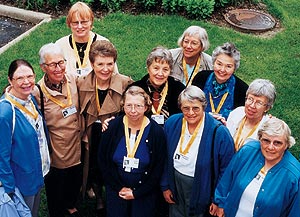| |
Round Robin Takes Flight
WHEN THE LETTERS ARRIVE, LOOK OUT.
THESE WOMEN HAVE CATCHING UP TO DO.
* BY KELLY VIANCOURT
 "I
DON'T REMEMBER DIGGING UP OUR MEMORY BOX," said Joann Elder to
the 70ish-year-old women gathered on the lawn of Fairchild House
on May 26. "Do you think it's still buried there?" she asked,
gazing toward the southwest corner of their former home. "I
DON'T REMEMBER DIGGING UP OUR MEMORY BOX," said Joann Elder to
the 70ish-year-old women gathered on the lawn of Fairchild House
on May 26. "Do you think it's still buried there?" she asked,
gazing toward the southwest corner of their former home.
Had a shovel been handy, no doubt some among this spirited bunch
would have tried to find out. Each of the 11 women, plus three
others, has enjoyed 50 adventuresome post-Oberlin years. Admirable
feats among this group abound: a Fulbright grant to New Zealand,
families raised in Third-World countries, mountain climbing lessons
at age 45, and dozens of trips around the globe. And because of
a half-century-old promise these women made to stay connected,
each has enjoyed an annual chronicle of their lives' events.
THREE-CENT
STAMPS
THEY
ARRIVED IN OBERLIN IN SEPTEMBER 1947 from hometowns in India,
Turkey, and across the United States, drawn to the liberal arts,
small-town atmosphere, and lack of Greek societies. By senior
year, the women were third-floor residents of newly remodeled
Fairchild House. Five were engaged to Oberlin men, and a sixth
had left the College after marrying her Oberlin fiancé
mid-year. Despite their divergent post-commencement plans, the
classmates promised to stay in touch.
That summer, the first Round Robin letter was launched and began
a 50-year annual trek around the world. Its guidelines were simple:
add your own letter (keeping it to a page or two) and send it
to the next Obie within three weeks. The "Robins," who all were
married in their 20s and certified to teach, shared milestones
and everyday details concerning their careers, families, health,
and travels. Photos, newspaper articles, and family trees were
often attached. The letters disappeared a few times--once over
Australia's Tasman Sea--and had to be restarted.
"When I added my name to that list in Fairchild, I never dreamed
that we
could keep a letter going for so long," said Peggy Goodyear, who
has lived most of her life abroad and whose New Zealand home has
been a popular destination for vacationing Obies. She was among
the group who returned in May for their 50th class reunion. As
the women posed for photographs, they laughed at the memories
of their Fairchild days: a new TV set, after-dinner bridge games,
a "forbidden" popcorn popper, extinguishing trashcan fires, and
the near loss of Debby Nicholls' opal engagement ring down the
sink. No one remembered unearthing the box of mementos they had
buried their senior year.
Correspondence from decades ago remains among the most memorable
for Robins today: the two years Elder lived with her children
in a North Indian village tent while her husband Joe '51 conducted
doctoral research. Goodyear being evacuated with her three children
from Egypt to Cyprus during the Six-Day War in 1967. Julie Ferreira,
who, with her husband Dick '50, led adult day-hikes through
the mountains of the U.S. northwest. Becky Holmes' life with
her family in the Netherlands, where husband Francis '50 researched
Dutch Elm disease. And more recently, the decline of Helen "Heathy"
Broholm, now battling Alzheimer's Disease, and whose husband
Richard writes her Robin contributions.
"At appropriate points in our history we have had discussions
about how best to use old cloth diapers and the pros and cons
of hormone replacement therapy," laughed Ruth Hood, who shared
an excerpt from her 1979 letter: With the continued concern
about oil, and nuclear energy as a viable alternative, we are
thankful that we went ahead with our energy-saving home! We
figure our electric bill is about one-half, thanks to our solar
collectors for water and spa heating.
"Reading of the Robin" rituals are commonplace among the women,
some of whom admit to taking notes or highlighting passages.
"When the Round Robin arrives in my mailbox, I take care of
anything that needs attention, then settle down in a comfortable
chair to quickly read through
the letters," said Ruth Weller. "Then later I read through each
one more carefully to savor everyone's news."
In preparing for their 50th-year reunion, the Robins conducted
an in-depth survey of their lives, careers, and families.
Nine of the women earned advanced degrees, all worked in education,
six helped support their husbands through doctoral study,
and eight travel with Elderhostel. Seven of the women married
Obies; the group averages 3.4 children and 4.2 grandchildren
per family.
By their 25th reunion, two of the original Robins had passed
away--Joan Schenck Johnson in a car accident, and Dorothy
Danielson Shaw of breast cancer. Two more Fairchild women
joined the Robin later. And although several of the alumnae
have seen each other over the years, the Robins met in Put-In-Bay,
Ohio, before reunion weekend for their first official gathering.
"These girls didn't stop talking for five minutes," laughed
one of the spouses. "But that was okay--we husbands got along
well, too."
The 1951 Obies are among several such Round Robin groups at
Oberlin, and they have little interest in taking their correspondence
high-tech. The women prefer to wait out the annual cycle instead
of converting the Robin to email, even though most in the
group use it regularly. "Email certainly has its place, but
there is nothing like a good old-fashioned letter," said Weller.
"It's a dying art, but it is a great way to communicate. It's
wonderful to hold a letter in your hand, read it, and re-read
it another day."
As for that memory box, no one knows for sure if it still
lies in the corner of the Fairchild lot. At their next reunion,
these Robins can swoop into the earth and find out. *
|

